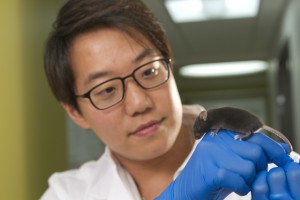"운동 안해도 살 빠지는 유전자 발견" Newly Discovered Hormone Mimics the Effects of Exercise
source awaremed.com
edited by kcontents
케이콘텐츠
땀 흘려 운동하지 않아도 살을 빼는 효과를 주는 유전자가 발견돼 학계의 관심이 쏠리고 있다. 미국 캘리포니아의 서던캘리포니아대학교 연구진이 발견한 유전자 'MOTS-c'는 인슐린 조절을 통해 몸무게를 줄여주고 혈당을 일정수치로 유지시키는 효과가 있는 것으로 밝혀졌다. 연구진이 비만 쥐를 대상으로 이 유전자를 실험한 결과, 비만이 억제됨과 동시에 나이에 따라 저하되는 인슐린 분비량과 당뇨의 예방 효과를 볼 수 있었다. 특히 인슐린의 경우, 민감도가 증가해 포도당이 체내에서 더욱 효율적으로 사용되는 것으로 밝혀졌다. 인슐린은 섭취한 음식의 탄수화물과 당 성분을 조절하는데 필요한 호르몬으로, 인슐린이 결핍되면 포도당 섭취가 저하되고 간에서 포도당 방출량이 증가해 고혈당, 즉 당뇨병을 일으킬 수 있다. 이 유전자는 특히 근육 세포에 직접적으로 관여해 근육량을 조절하는데 효과적이며, 인슐린의 민감도가 높아지면 나이에 따른 인슐린 분비 변화 또는 식습관에 따른 인슐린 대응이 보다 안정적일 수 있다. 인슐린은 비만과 매우 밀접한 관계가 있다. 인슐린이 제대로 작동하지 않는 인슐린 저항성이 오면 당뇨병으로 이어지고, 당뇨는 역시 비만을 비롯한 각종 대사성 질환과 연관이 있다. 결과적으로 인슐린 분비가 정상적이지 못할 경우 비만과 당뇨에 시달릴 수 있다는 뜻이다. 연구를 이끈 서던캘리포니아대학교의 핀채스 코헨 교수는 "신체 노화로 인한 인슐린 분비 변화에 따른 당뇨나 비만과 연관된 유전자를 찾는데 성공했다"면서 "이 호르몬은 음식이 에너지로 변환되는데 필요한 주요 호르몬 중에서도 매우 독특한 역할을 한다"고 설명했다. 연구진은 'MOTS-c' 유전자를 실험실의 쥐뿐만 아니라 인간을 포함한 포유동물을 대상으로 추가 실험을 실시할 예정이며, 인슐린 정상화를 통한 비만 치료 및 예방이 가능해 질 것으로 기대를 모으고 있다. 사진=포토리아 [서울신문 나우뉴스] 송혜민 기자huimin0217@seoul.co.kr |
Newly Discovered Hormone Mimics the Effects of Exercise

Natural human hormone protects against obesity and diabetes in mice Scientists at the USC Leonard Davis School of Gerontology have discovered a new hormone that fights the weight gain caused by a high-fat Western diet and normalizes the metabolism – effects commonly associated with exercising. Hormones are molecules that act as the body’s signals, triggering various physiological responses. The newly discovered hormone, dubbed “MOTS-c,” primarily targets muscle tissue, where it restores insulin sensitivity, counteracting diet-induced and age-dependent insulin resistance. “This represents a major advance in the identification of new treatments for age-related diseases such as diabetes,” said Pinchas Cohen, dean of the USC Davis school and senior author of a study on the research, which will appear in Cell Metabolism on March 3. To test the effects of MOTS-c, the team injected the hormone into mice fed a high-fat diet, which typically causes them to grow obese and develop a resistance to insulin. The injections not only suppressed both effects in mice, they also reversed age-dependent insulin-resistance, a condition that precedes diabetes. “This discovery sheds new light on mitochondria and positions them as active regulators of metabolism,” said Changhan Lee, assistant professor at USC Davis and lead author of the study. MOTS-c is unique among hormones in that it is encoded in the DNA of mitochondria — the “powerhouses” of cells that convert food into energy. Other hormones are encoded in DNA in the nucleus. Lee and Cohen collaborated with colleagues from the USC school as well as the David Geffen School of Medicine at UCLA and the National Institutes of Health. While all of the experiments on MOTS-c to date have been performed on lab mice, the molecular mechanisms that make it function in mice exist in all mammals, including humans. The MOTS-c intellectual property has been licensed to a biotechnology company, and clinical trials in humans could begin within the next three years, Cohen said. This research was funded by National Institutes of Health (grants 1R01AG 034430 EUREKA Award, 1R01GM 090311 Transformative RO1, 1R01ES 020812), a Glenn Award, an Ellison Medical Foundation New Scholar Award, and a SC-CTSI grant. Contact: Robert Perkins at (213) 740-9226 or perkinsr@usc.edu; or Elizabeth Newcomb at (213) 740-0821 or bethdunh@usc.edu https://pressroom.usc.edu/newly-discovered-hormone-mimics-the-effects-of-exercise/ |
edited by kcontents
"from past to future"
데일리건설뉴스 construction news
콘페이퍼 conpaper









